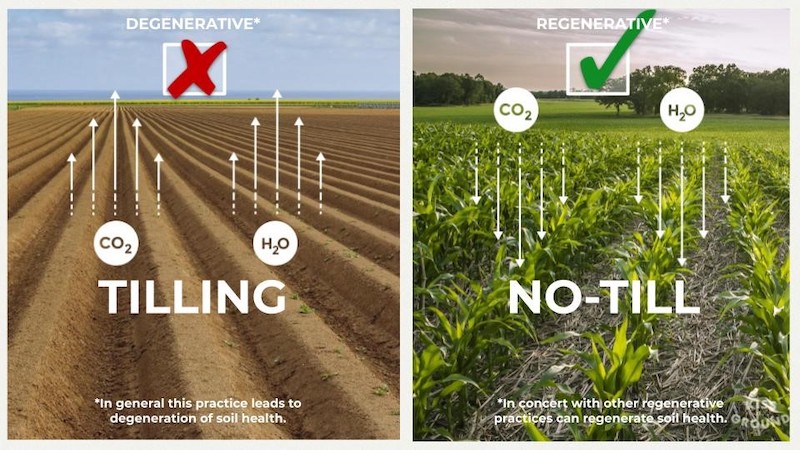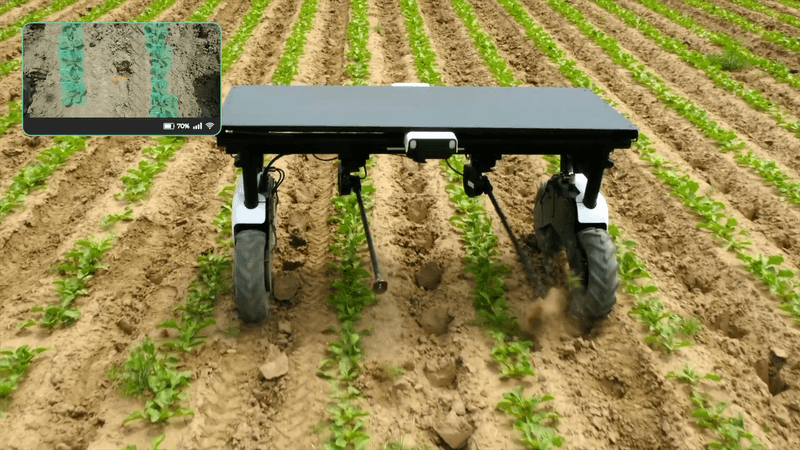Regenerative Annual Cropping
Regenerative annual cropping involves farming practices that enhance ecosystem function, maximize water absorption, photosynthesis, and carbon sequestration. This approach aims to improve soil health, increase biodiversity, and reduce greenhouse gas emissions.

Benefits of Regeneration (Means&Matters)
View open jobs in this Solution
Example Companies/Organizations
- Iron Ox - Uses technology to grow food renewably, contributing to regenerative agriculture practices.
- The Rodale Institute - Pioneers in organic farming and regenerative agriculture research.
- The Land Institute - Focuses on developing perennial grain crops and sustainable farming practices.
- The Soil Association - Promotes organic farming and regenerative agriculture.
Overview
Regenerative annual cropping systems have shown promise in mitigating climate change by enhancing soil health and sequestering carbon. Techniques such as no-till farming, cover cropping, and precision agriculture play a crucial role in these systems.
- Regenerative Agriculture: The key to fixing climate change through agriculture - Climate Tech Distillery
Progress Made
Significant advancements have been made in regenerative annual cropping:
- No-Till Farming: Enables planting without soil disruption, limiting carbon release.
- Cover Crops: Improve soil health and decrease carbon emissions by keeping carbon trapped in the soil.
- Precision Agriculture: Reduces greenhouse gas emissions by minimizing fuel and chemical consumption through optimized farming.
Case Studies:
- The Rodale Institute, USA: Over 30 years of research in regenerative agriculture (Rodale Institute). Their findings demonstrate the potential for regenerative practices to improve soil health and sequester carbon.
- The Land Institute, USA: Developing perennial grain crops and sustainable farming practices for over 20 years (The Land Institute). Their work on Kernza, a perennial grain, shows promise for reducing greenhouse gas emissions.
- The Soil Association, UK: Promoting organic farming and regenerative agriculture for over 10 years (The Soil Association). Their initiatives focus on improving soil health and biodiversity.
Technologies
Autonomous Agricultural Robots
- Aigen: Creates autonomous agricultural robots to reduce pesticide use through tasks such as weeding. They are solar-powered and do not rely on fossil fuels like other farm equipment.
Case Study:
- Aigen, USA: Develops solar-powered robots for weeding, reducing pesticide use (Aigen). Their technology is highlighted in a CNBC article.

Lessons Learned
- Potential: Regenerative annual cropping can make significant strides in reducing atmospheric carbon but is still evolving.
- Challenges: Some failures have arisen due to the nascent stage of the technology.
- Collaboration: It's crucial to engage with seasoned farmers and entities knowledgeable about the technology.
- Comprehensive Strategy: This approach is not an exclusive solution but should be a part of broader carbon reduction efforts.
Challenges Ahead
- Funding & Resources: A significant barrier to advancing regenerative annual cropping.
- Research & Development: Necessary to elevate yields and streamline production.
- Education & Outreach: Promote understanding and adoption among farmers and the public.
- Infrastructure: Investment in facilities such as storage, processing, and transport is needed to support this farming approach.
- Policy Changes: Advocacy for amendments in local, state, and federal regulations to favor regenerative agriculture.
Best Path Forward
- Awareness: Boost public understanding of regenerative annual cropping's advantages.
- Farmer Engagement: Motivate more farmers to employ regenerative annual cropping methods.
- R&D Investment: Foster research to refine and enhance these agricultural technologies.
- Financial Motivators: Offer financial incentives to propel the adoption of regenerative annual cropping practices.
Prominent supporters include The Rodale Institute, The Land Institute, and The Soil Association.
Image credit: Means&Matters